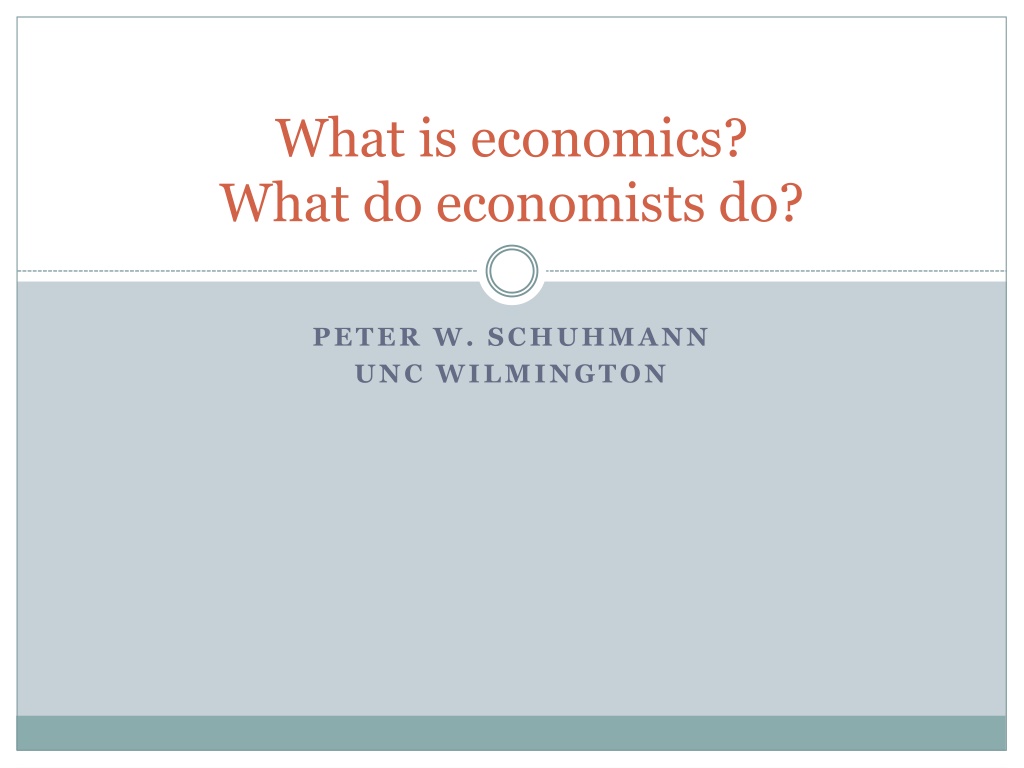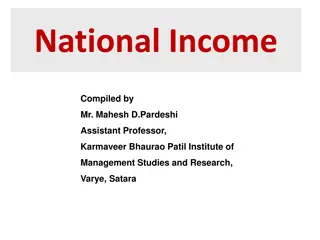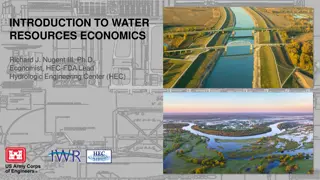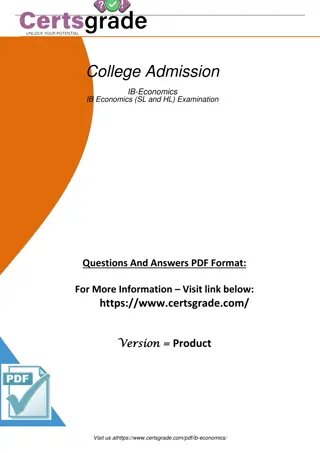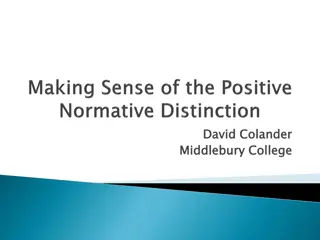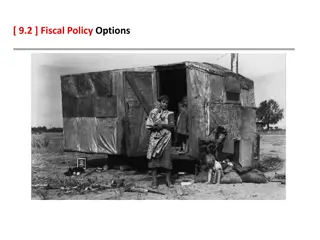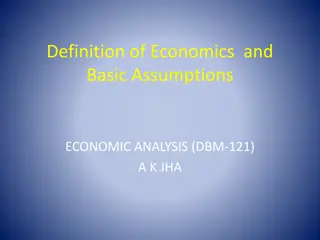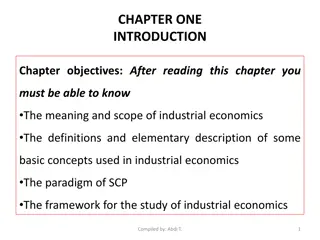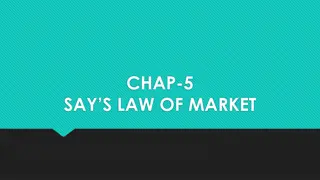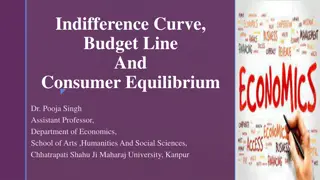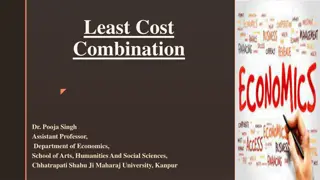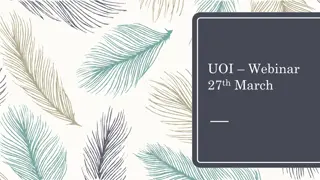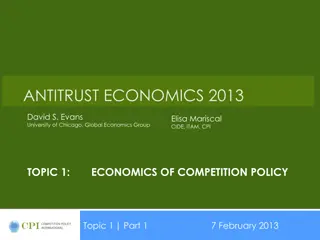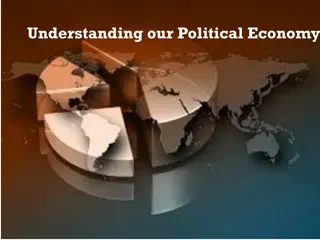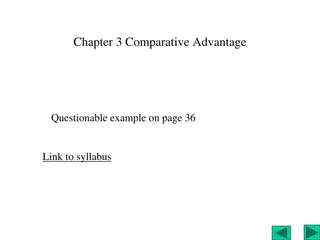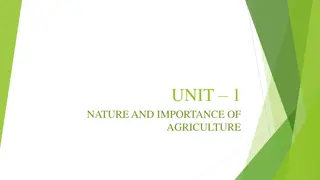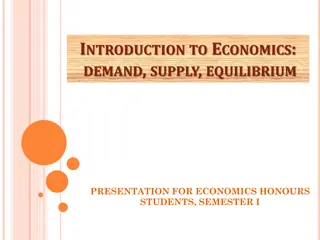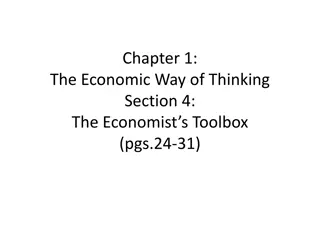Understanding Economics: What Economists Do & How They Study
Economics, as the study of how individuals, businesses, societies, and nations handle scarcity, encompasses the work of economists. They analyze resource distributions, assess impacts on human well-being, and provide insights for decision-making using theory, data, math, and statistics. While economics aims to be objective, it blends theory and empirical testing to draw conclusions. The field is a mix of science and prediction akin to forecasting leaf movements on a windy day rather than objects in a vacuum.
Download Presentation

Please find below an Image/Link to download the presentation.
The content on the website is provided AS IS for your information and personal use only. It may not be sold, licensed, or shared on other websites without obtaining consent from the author. Download presentation by click this link. If you encounter any issues during the download, it is possible that the publisher has removed the file from their server.
E N D
Presentation Transcript
What is economics? What do economists do? PETER W. SCHUHMANN UNC WILMINGTON
What is economics all about? ECON 101 definition: Economics is the study of how people , businesses, societies, or nations deal with scarcity . Economics is what economists do .
What do economists do? Economists study how & why societies, nations, business and people distribute resources, and the associated implications for human wellbeing.
How do economists study that stuff? Depict economic relationships with mathematics- based theory... Reasoning. Economists also collect, compile and analyze data. Reasoning.
Then what? Economists try to provide information that will be useful for decision-makers. What is the nature and magnitude of cause-and-effect? How did we get here? What would happen if ? What are the costs and benefits of an action (or inaction)? What is the best way to accomplish a particular goal? Economists use theory, data, math and statistics to help solve real-world problems.
Economics is (supposed to be) objective When economists analyze a situation, they tend to do so without personal opinion. A cold-hearted search for the truth
Is economics a science? Yes and no. Science can viewed as the study of things that can be proven false (even if the likelihood is very small). Karl Popper Economists use theory to examine how facts fit together. Economists empirically test theory to see whether the facts support what theory predicts. But, unlike some physical scientists, economists rarely use controlled experiments to test theories. We must use whatever facts are available and rely on statistical analysis to draw conclusions.
Is economics a science? The problems that we want economists to help solve are more like predicting how leaves will fall on a windy day than predicting how objects will fall in a vacuum. Daniel Hausman, NYT, 2015
What can economists study? Anything that involves decision-making. Anything that involves choices and tradeoffs. Anything.
Journal of Economic Literature Classification of Fields A B C D E F G H I J K L M N O P Q R Y Z General Economics and Teaching History of Economic Thought, Methodology, and Heterodox Approaches Mathematical and Quantitative Methods Microeconomics Macroeconomics and Monetary Economics International Economics Financial Economics Public Economics Health, Education, and Welfare Labor and Demographic Economics Law and Economics Industrial Organization Business Administration & Business Economics Marketing Accounting Personnel Economic History Economic Development, Innovation, Technological Change, and Growth Economic Systems Agricultural & Natural Resource Economics Environmental & Ecological Economics Urban, Rural, Regional, Real Estate, and Transportation Economics Miscellaneous Categories Other Special Topics
Micro and Macro Macroeconomics is the study of the entire economy. Macroeconomists are concerned with relationships between broadly defined economic variables such as the overall price level, total output and unemployment. Macroeconomists might attempt to forecast the effects of large scale unemployment, economic growth, inflation, productivity, and investments. What is the economy going to do next...?
Fields of Macroeconomics Monetary economics Money Central banking and policy Interest rates Credit markets International economics Trade Exchange rates International investment Growth and development Foreign aid
Micro and Macro Microeconomics is the study of the choices and behaviors of individual consumers, businesses and governments. Private sector microeconomists might help businesses maximize profits, reduce costs or establish prices. Public sector microeconomists might analyze the costs and benefits of government programs or policies (e.g. transportation, health care, environment).
Fields of Microeconomics Health economics Economics of education Environmental and natural resource economics Industrial organization Urban/regional economics Labor and demographics
What kind of skills do economists use? Critical thinking Mathematics Statistics Data acquisition & analysis Technical software Writing, reporting & communication
Where do economists work? Roughly half of all economists work for local, state or federal governments. Other areas: Banking & Investments Consulting (public or private) Manufacturing Transportation Nonprofit organizations/NGOs International organizations (World Bank, IMF etc) Academics
Is everyone that studies economics an economist? Potential job titles for those with an economics background: Financial analyst Market/pricing analyst Public policy consultant Researcher /research assistant Purchasing manager Journalist Lawyer Urban/regional planner Private sector upper manager Data analyst
What do economists agree on? The goal of public policy should be to improve the well-being of the public. People respond to incentives. Voluntary transactions are good. Analyzing costs and benefits provides a lot of insight into the way the world works.
What are the most important concepts in econ? Opportunity costs ( TiNSTaaFL ) Thinking at the margin
Environmental Econ. Vs. Ecological Econ. Both are concerned with how socio-economic systems interact with natural systems. Environmental economics tends to operate within the mainstream neoclassical methodology (basic tenets of behavior). Jim s talk will cover the basics and you ll get lots more info during the week!
Environmental Econ. Vs. Ecological Econ. Ecological Economics started in the 80s (Costanza). Views the economy as a subset of the biosphere rather than viewing the environment as an input into the economy. Focus on systems rather than resources. Given the constraints of a closed system, focus on development rather than growth. (Initially) rejected the market mechanism as an approach to understanding and solving environmental problems. Asks big picture questions (e.g. how to change the economic system so that it achieves economic and environmental sustainability).
